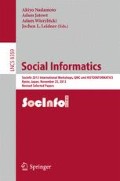Abstract
Can we establish the importance of people by simply analyzing the set of sent and received emails, having no access to subject lines or contents of messages? The answer, apparently, is ”yes we can”. Intrinsic behavior of people reveals simple patterns in choosing which emails to answer next. Our theory is based on two assumptions. We assume that people do their email communication in bursts, answering several messages consecutively and that they can freely choose the order of answers. Secondly, we believe that people use priority queues to manage their internal task lists, including the list of emails to be answered. Looking at timing and ordering of responses we derive individual rankings of importance of actors, because we posit that people have a tendency to reply to important actors first. These individual subjective rankings are significant because they reflect the relative importance of other actors as perceived by each actor. The individual rankings are aggregated into a global ranking of importance of all actors. We perform an experimental evaluation of our model by analyzing the dataset consisting of over 600 000 emails sent during one year period to 200 employees of our university. Our final ranking closely reflects the ”true” importance of employees computed based on surveys. We think that our model is general and can be applied whenever behavioral data is available which includes any choice made by actors from a set of available alternatives with the alternatives having varying degrees of importance to individual actors.
The original version of this chapter was revised. An erratum for this chapter can be found at: http://dx.doi.org/10.1007/978-3-642-55285-4_12
Access this chapter
Tax calculation will be finalised at checkout
Purchases are for personal use only
Preview
Unable to display preview. Download preview PDF.
References
Barabasi, A.-L.: The origin of bursts and heavy tails in human dynamics. Nature 435(7039), 207–211 (2005)
Bird, C., Gourley, A., Devanbu, P., Gertz, M., Swaminathan, A.: Mining email social networks. In: Proceedings of the 2006 International Workshop on Mining Software Repositories, pp. 137–143. ACM (2006)
Blanzieri, E., Bryl, A.: A survey of learning-based techniques of email spam filtering. Artificial Intelligence Review 29(1), 63–92 (2008)
Burton-Jones, A., Hubona, G.S.: Individual differences and usage behavior: revisiting a technology acceptance model assumption. ACM SIGMIS Database 36(2), 58–77 (2005)
Cormack, G.V.: Email spam filtering: A systematic review. Foundations and Trends in Information Retrieval 1(4), 335–455 (2007)
Culotta, A., Bekkerman, R., McCallum, A.: Extracting social networks and contact information from email and the web (2004)
Diesner, J., Carley, K.M.: Exploration of communication networks from the enron email corpus. In: SIAM Int. Conference on Data Mining: Workshop on Link Analysis, Counterterrorism and Security, Newport Beach, CA. Citeseer (2005)
Dwork, C., Kumar, R., Naor, M., Sivakumar, D.: Rank aggregation methods for the web. In: Proc. of the 10th International Conference on World Wide Web, pp. 613–622. ACM (2001)
Gross, D., Shortle, J.F., Thompson, J.M., Harris, C.M.: Fundamentals of queueing theory. Wiley.com (2013)
Li, H., Zhang, J., Wang, H., Huang, S.: A mining algorithm for email’s relationships based on neural networks. In: 2008 International Conference on Computer Science and Software Engineering, vol. 4, pp. 1122–1125. IEEE (2008)
Lubarski, P., Morzy, M.: Measuring the importance of users in a social network based on email communication patterns. In: Proceedings of the 2012 International Conference on Advances in Social Networks Analysis and Mining (ASONAM 2012), pp. 86–90. IEEE Computer Society (2012)
Whittaker, S., Bellotti, V., Gwizdka, J.: Email in personal information management. Communications of the ACM 49(1), 68–73 (2006)
Whittaker, S., Sidner, C.: Email overload: exploring personal information management of email. In: Proceedings of the SIGCHI Conference on Human Factors in Computing Systems, pp. 276–283. ACM (1996)
Yoo, S., Yang, Y., Lin, F., Moon, I.-C.: Mining social networks for personalized email prioritization. In: Proc. of the 15th ACM SIGKDD Int. Conference on Knowledge Discovery and Data Mining, pp. 967–976. ACM (2009)
Author information
Authors and Affiliations
Editor information
Editors and Affiliations
Rights and permissions
Copyright information
© 2014 Springer-Verlag Berlin Heidelberg
About this paper
Cite this paper
Lubarski, P., Łupkowski, P., Kleka, P., Morzy, M. (2014). Using E-mail Communication Network for Importance Measurement in Collaboration Environments. In: Nadamoto, A., Jatowt, A., Wierzbicki, A., Leidner, J.L. (eds) Social Informatics. SocInfo 2013. Lecture Notes in Computer Science, vol 8359. Springer, Berlin, Heidelberg. https://doi.org/10.1007/978-3-642-55285-4_4
Download citation
DOI: https://doi.org/10.1007/978-3-642-55285-4_4
Publisher Name: Springer, Berlin, Heidelberg
Print ISBN: 978-3-642-55284-7
Online ISBN: 978-3-642-55285-4
eBook Packages: Computer ScienceComputer Science (R0)

